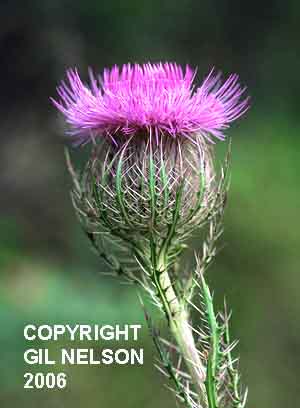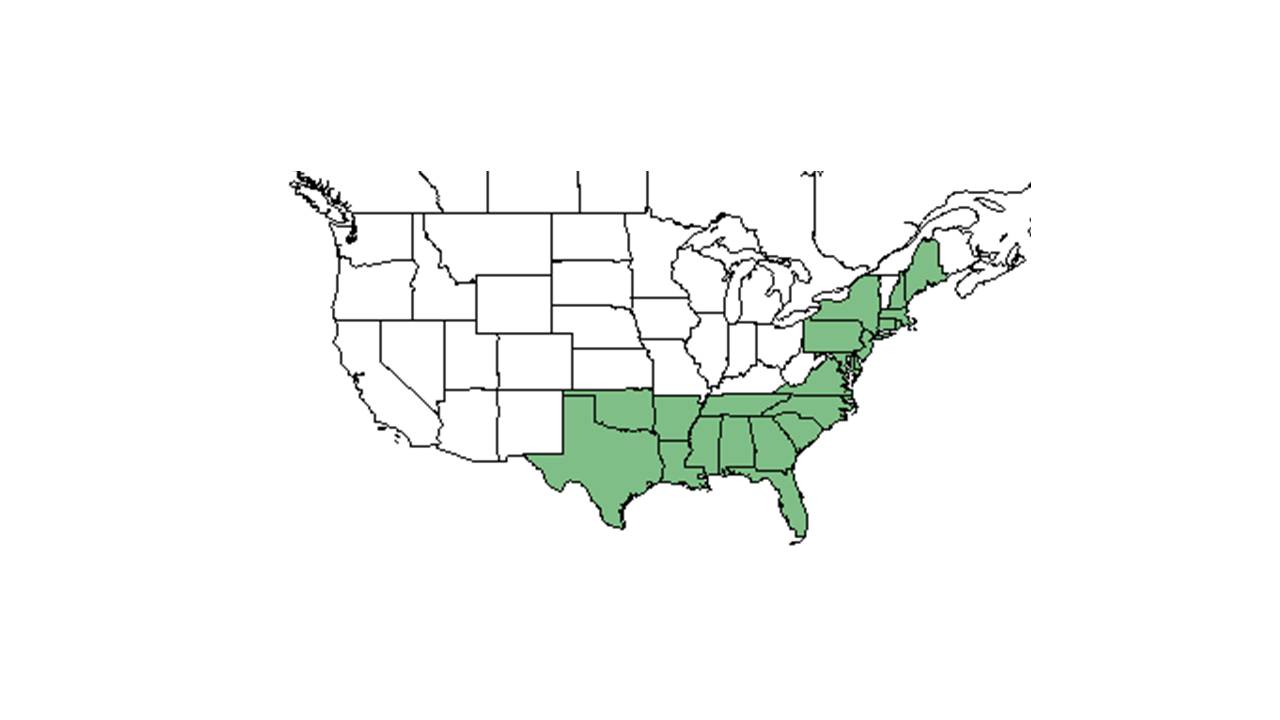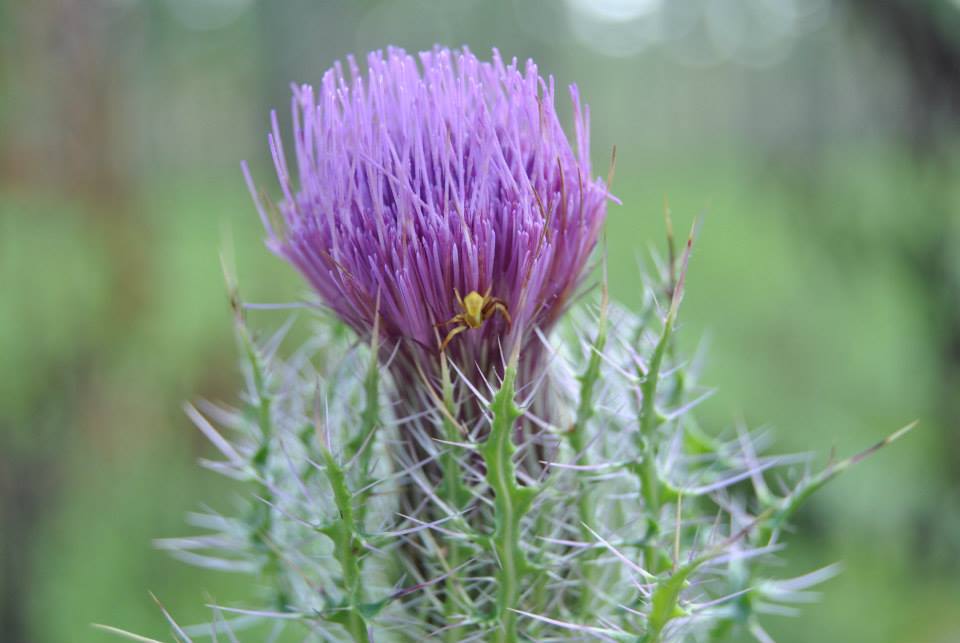Difference between revisions of "Cirsium horridulum"
Emmazeitler (talk | contribs) (→Taxonomic notes) |
Emmazeitler (talk | contribs) |
||
| Line 18: | Line 18: | ||
}} | }} | ||
| − | Common name: Yellow Thistle | + | Common name: Yellow Thistle, Bigspine Thistle, Southern Yellow Thistle |
==Taxonomic notes== | ==Taxonomic notes== | ||
Synonyms: ''Cirsium vittatum'' Small; ''Cirsium smallii'' Britton.<ref name="weakley">Weakley, A.S. 2015. Flora of the southern and mid-atlantic states. Working Draft of 21 May 2015. University of North Carolina at Chapel Hill, Chapel Hill, North Carolina.</ref> | Synonyms: ''Cirsium vittatum'' Small; ''Cirsium smallii'' Britton.<ref name="weakley">Weakley, A.S. 2015. Flora of the southern and mid-atlantic states. Working Draft of 21 May 2015. University of North Carolina at Chapel Hill, Chapel Hill, North Carolina.</ref> | ||
Revision as of 13:34, 15 September 2020
| Cirsium horridulum | |
|---|---|

| |
| photo by Gil Nelson | |
| Scientific classification | |
| Kingdom: | Plantae |
| Division: | Magnoliophyta - Flowering plants |
| Class: | Magnoliopsida – Dicotyledons |
| Order: | Asterales |
| Family: | Asteraceae ⁄ Compositae |
| Genus: | Cirsium |
| Species: | C. horridulum |
| Binomial name | |
| Cirsium horridulum Michx. | |

| |
| Natural range of Cirsium horridulum from USDA NRCS Plants Database. | |
Common name: Yellow Thistle, Bigspine Thistle, Southern Yellow Thistle
Contents
Taxonomic notes
Synonyms: Cirsium vittatum Small; Cirsium smallii Britton.[1]
Varieties: Cirsium horridulum Michaux var. horridulum; Cirsium horridulum Michaux var. megacanthum (Nuttall) D.J. Keil; Cirsium horridulum Michaux var. vittatum (Small) R.W. Long.[1]
Description
A description of Cirsium horridulum is provided in The Flora of North America. This species is thistle-like and tends to resprout growing erect to about 1 meter. [2] There are three varieties: horridulum, magacanthum, and vittatum. Var. horridulum is the only variety with yellow flowers, but it may also have red and purple flowers. [3]
Distribution
C. horridulum is found in all the eastern coastal states from Maine to Texas, Tennessee, Arkansas, and Oklahoma. [4] The varieties may have differing ranges: variety C. horridulum is found throughout the species range, except Oklahoma and Arkansas, variety C. megacanthum is found only in the lower Piedmont and coastal plain, and the variety C. vittatum is isolated to the coastal plain. [3]
Ecology
Habitat
It has been found in pine-wiregrass woodlands, savannahs, pine-scrub oak woodlands, juniper-pine-palm woodlands, longleaf pine-turkey oak barrens, pine hills, cabbage palm hammocks, and along streams and marshes. This species has also been observed in human disturbed habitats such as roadsides, weedy fields, waste grounds, ligand fields, flat spoil areas, shallow watered ditches, pine plantations, and frequently mowed areas. Takes to the moister soil below longleaf pine-scrub oak forested sand hills and occurs in open light conditions in loamy sand or peat, loose sand, and drying loamy sand. Usually inhabits moist open areas between either drier or wetter conditions and may be present in well-drained uplands and limestone substrate. [2] It is considered a facultative upland species that usually is found in non-wetland ecosystems, but can grow in wetlands as well.[5]
Associated species include Pinus palustris, Quercus laevis, Melanthera, Eleocharis, Juncus, Xyris, and others. [2]
Phenology
This species has been observed flowering from March to October and fruiting from March through November. [2] The varieties may flower at different times: variety C. horridulum flowers April to June and September with peak inflorescence in April, variety C. megacanthum flowers March to June and variety C. vittatum flowers from February to August. [3][6] Kevin Robertson has observed this species flower within three months of burning. KMR The variety C. horridulum has produced natural hybrids with C. pumilum var. pumilum. [3]
Seed dispersal
Seeds are cypsela that are wind and bird dispersed. [3] This species is thought to be dispersed by wind. [7]
Fire ecology
This species is able to grow in burned old fields.[2] One study found C. horridulum to be most frequent in response to summer seasonality burns, rather than winter and spring burns.[8]
Pollination
The following Hymenoptera families and species were observed visiting flowers of Cirsium horridulum at Archbold Biological Station. [9]
Apidae: Apis mellifera
Halictidae: Augochlorella gratiosa, Halictus poeyi, Lasioglossum nymphalis, L. pectoralis
Megachilidae: Lithurgus gibbosus, Megachile brevis pseudobrevis
Other pollinators in the Hymenoptera order observed to pollinate this species include Dialictus nymphalis, Eulaeus pectoralis, Halictus ligatus, and Osmia chalybea.[10][11] C. horridulum is considered to be of special value to native bees since it attracts large numbers for pollination.[12]
Use by animals
C. horridulum comprises approximately 5-10% of the diet for terrestrial birds.[13] This species is the larval host to the little metalmark (Calephelis virginiensis) and painted lady (Vanessa cardui) butterflies.[14] This species also provides nesting materials and structure for various native bees.[12] Members of the Seminole Tribe have been said to use parts of this plant to make blowgun darts.[14] Medicinally, the root and leaves were soaked with whiskey and drunk in order to clear the lungs and throat from phlegm, and it is a strong astringent. The white heart of the plant can be eaten raw.[15]
Diseases and parasites
The leaf epidermis is surrounded by an internal and external cuticle, which reduces the likelihood of a pathogen entering the plant. [16]
Conservation and management
C. horridulum is listed as an endangered species by the Connecticut Department of Environmental Protection, the New Hampshire Division of Forests and Lands, and the Pennsylvania Department of Conservation and Natural Resources. It is also listed as threatened by the Rhode Island Department of Environmental Management. This species is considered a noxious weed by the Arkansas State Plant Board, and the Iowa Department of Agricultire and Land Stewardship.[5]
Cultivation and restoration
Photo Gallery
References and notes
- ↑ 1.0 1.1 Weakley, A.S. 2015. Flora of the southern and mid-atlantic states. Working Draft of 21 May 2015. University of North Carolina at Chapel Hill, Chapel Hill, North Carolina.
- ↑ 2.0 2.1 2.2 2.3 2.4 Florida State University Robert K. Godfrey Herbarium database. URL: http://herbarium.bio.fsu.edu. Last accessed: June 2014. Collectors: L. C. Anderson, G. R. Cooley, J. R. Eaton, R. K. Godfrey, E. Keppner, L. Keppner, R. Kral, H. Kurz, K. MacClendon, K. M. Meyer, K. Patel, P. L. Redfearn Jr., W. R. Stimson, A. Townesmith, L. B. Trott, K. L. Tyson, and C. E. Wood Jr. States and Counties: Florida: Bay, Calhoun, Dade, Dixie, Escambia, Franklin, Gadsden, Jackson, Jefferson, Leon, Levy, Liberty, Marion, Monroe, Pasco, Polk, Taylor, Wakulla, and Washington. Georgia: Grady and Thomas.
- ↑ 3.0 3.1 3.2 3.3 3.4 [[1]]Encyclopedia of Life. Accessed: April 14, 2016
- ↑ [[2]]U.S. Wildflowers. Accessed: April 14, 2016
- ↑ 5.0 5.1 USDA, NRCS. (2016). The PLANTS Database (http://plants.usda.gov, 5 April 2019). National Plant Data Team, Greensboro, NC 27401-4901 USA.
- ↑ Nelson, G. PanFlora: Plant data for the eastern United States with emphasis on the Southeastern Coastal Plains, Florida, and the Florida Panhandle. www.gilnelson.com/PanFlora/ Accessed: 7 DEC 2016
- ↑ Kirkman, L. Katherine. Unpublished database of seed dispersal mode of plants found in Coastal Plain longleaf pine-grasslands of the Jones Ecological Research Center, Georgia.
- ↑ Kush, J. S., et al. (2000). Understory plant community response to season of burn in natural longleaf pine forests. Proceedings 21st Tall Timbers Fire Ecology Conference. Fire and forest ecology: innovative silviculture & vegetation management, Tallahassee, FL, Tall Timbers Research, Inc.
- ↑ Deyrup, M.A. and N.D. 2015. Database of observations of Hymenoptera visitations to flowers of plants on Archbold Biological Station, Florida, USA.
- ↑ Deyrup, M. J. E., and Beth Norden (2002). "The diversity and floral hosts of bees at the Archbold Biological Station, Florida (Hymenoptera: Apoidea)." Insecta mundi 16(1-3).
- ↑ Hall, H. G. a. J. S. A. (2010). "Surveys of bees (Hymenoptera: Apoidea: Anthophila) in natural areas of Alachua County in north-central Florida." The Florida Entomologist 93(4): 609-629.
- ↑ 12.0 12.1 [[3]] Lady Bird Johnson Wildflower Center. Accessed: April 5, 2019
- ↑ Miller, J.H., and K.V. Miller. 1999. Forest plants of the southeast and their wildlife uses. Southern Weed Science Society.
- ↑ 14.0 14.1 [[4]]Florida Native Plant Society. Accessed: April 14, 2016
- ↑ Speck, F. G. (1941). "A list of plant curatives obtained from the Houma Indians of Louisiana." Primitive Man 14(4): 49-73.
- ↑ Pesacreta, T. C. and K. H. Hasenstein (1999). "The Internal Cuticle of Cirsium horridulum (Asteraceae) Leaves." American Journal of Botany 86(7): 923-928.
